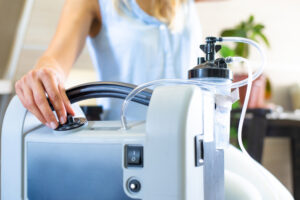For many adults, the shift to home respiratory care offers not just comfort—but control. It’s a powerful decision. But is it the right one for you?
Because of advanced ventilation support, more people are finding ways to breathe better—without being tied to a hospital bed. Let’s take a closer look at what home respiratory care involves, who it’s best suited for, and how it might just change your life.
What Is Home Respiratory Care?
Home respiratory care is exactly what it sounds like: clinical respiratory support delivered in the comfort of your home. It includes services such as:
- Invasive and Non-invasive ventilation support
- Tracheostomy care
- High frequency percussive vests
- Respiratory therapy
- Administrating of medication
- Ongoing monitoring and assessments from licensed respiratory therapists
But it’s not just about machines and medications. Home care is a model designed to meet people where they are—physically, emotionally, and medically. It means fewer hospital trips, more personalized attention, and the ability to recover or manage your condition on your terms.
Who Benefits Most from Home Respiratory Care?
You may be a candidate for home respiratory care if you’ve been diagnosed with any of the following:
- Chronic Obstructive Pulmonary Disease (COPD)
- Emphysema
- Pulmonary fibrosis
- Neuromuscular disorders affecting breathing
- Amyotrophic Lateral Sclerosis (ALS)
- Post-COVID respiratory complications
ALS and Home Respiratory Support
For individuals living with ALS, breathing becomes increasingly difficult as the disease progresses and weakens the muscles involved in respiration. In the early stages, shortness of breath may only occur during exertion or while lying down. Over time, non-invasive ventilation support like BiPAP and oxygen therapy can play a vital role in maintaining comfort, quality of life, and sleep quality.
Transitioning to home respiratory care allows those with ALS to receive expert respiratory support in a familiar environment, reducing the burden of frequent hospital visits and giving both patients and families a greater sense of stability and peace.
Ask Yourself These Questions
- Am I stable enough to manage my condition outside a hospital?
- Have I been discharged but still need breathing support at home?
- Do I struggle with mobility, making clinic visits difficult?
- Do I want more control and consistency in my daily care?
If “yes,” it might be time to talk with your care team about transitioning to home respiratory care.
The Role of Respiratory Therapists in Your Home Care Plan
You’ll be supported by a team—and respiratory therapists play a leading role. These licensed professionals are specially trained to assess your lung function, set up and manage equipment, provide education, and troubleshoot when things go sideways.
They aren’t just tech experts—they’re educators, advocates, and partners in your long-term wellness. For ALS patients, this also means helping adapt to the evolving stages of breathing support.
What to Expect When Starting Home Respiratory Care
Step 1: Assessment
Before any equipment arrives, a thorough evaluation is done. Your doctor and care team determine what level of respiratory support you need, how often you’ll require check-ins, and whether additional services—like nursing or physical therapy—should be included.
Step 2: Setup and Training
Once you’re approved for care, Sail Healthcare’s team handles the delivery and setup of all equipment. But most importantly, we make sure you understand exactly how to use it. You’ll receive hands-on medical equipment training with one of our respiratory therapists, so you feel confident and supported.
Step 3: Ongoing Monitoring and Support
Home doesn’t mean alone. We stay in touch. Regular visits, remote monitoring (if needed), and easy access to our care team mean you’re never left wondering, “What now?” If your symptoms change, we’re ready to adjust your care—fast.
Advantages of Home Respiratory Care
More Comfort, Less Stress
You sleep in your own bed. Eat your own food. Live at your own pace. For many people, home care brings emotional comfort that hospitals can’t match.
Reduced Risk of Infection
Hospitals can expose patients to new viruses or bacteria. At home, your exposure is limited—which can mean fewer setbacks and more consistent progress.
Cost-Effective
In many cases, home respiratory care is more affordable than extended hospital stays or rehab center stays, especially when insurance covers long-term support services.
Things to Consider Before Making the Transition
It’s not all smooth sailing. Home care requires space for equipment, reliable caregivers, and an understanding of what to do in emergencies. That’s why education and planning are essential. We don’t just drop off gear—we walk with you every step of the way.
How Sail Healthcare Can Help
At Sail Healthcare, we believe that healing and comfort don’t have to be separate goals. Our home respiratory care team includes experienced respiratory therapists, educators, and compassionate support staff who treat you like more than a patient. You’re a person with goals, routines, and preferences—and we honor that.
Whether you’re managing COPD, living with ALS, or recovering from a recent hospitalization, we’re here to help you navigate home respiratory care clearly, confidently, and with heart. Learn more or get started at Sail Healthcare.
